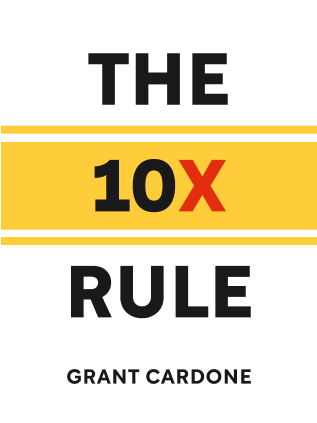

This article is an excerpt from the Shortform book guide to "The 10X Rule" by Grant Cardone. Shortform has the world's best summaries and analyses of books you should be reading.
Like this article? Sign up for a free trial here .
What are the different levels of effort? How does extreme effort correspond to extraordinary results?
In The 10X Rule, Grant Cardone describes four levels of effort. The highest is extreme effort, which is what is required under the 10X system to achieve great success.
Read more about the four levels of effort and what you should aim for.
Four Levels of Effort
There’s no formula for calculating how much action it will take to reach a specific goal. But in general, the more effort you put in, the better your chances of success. Your actions must be both consistent and persistent.
Applying enough effort is more important than having the right idea or business plan. Most people fail because they don’t do enough (take sufficient action) to succeed. Everyone opts for one of these four levels of effort, but only the fourth brings success:
1) Not doing anything
2) Retreating
3) Taking an average amount of action
4) Taking extreme action
We’ve all acted at each of these levels, depending on the situation. You might put extreme effort into your career, but back away from acting in another situation, such as a relationship or exercising for your health.
Typically, people do nothing, retreat, or put in an average amount of action. Doing nothing and retreating result in failure. Taking average action produces no better than average results. Only extreme action guarantees success. Following is a closer look at the levels of effort:
1) Not Doing Anything
You may choose not to do anything to advance your career, improve your finances or build your relationships. People who choose passivity have given up on their dreams and decided to take life as it comes. They’re bored, lethargic, and lack motivation or a sense of purpose.
While doing nothing may sound like a way to avoid stress or disappointment, it requires a surprising amount of effort. In fact, each of the four action levels requires effort. People who decide to do nothing devote time and energy justifying it to themselves and others.
Interestingly, people who choose to do nothing in some areas of their lives often devote extreme action to another, usually a hobby such as gaming or biking, or a time-waster.
2) Retreating
People who retreat or backpedal often do so because they fear action will have negative consequences. They may actually have experienced problems like rejection or failure in the past and want to prevent them from recurring, or they just fear them. Fear is a normal emotion and plays into the levels of effort.
The normal human impulse is to push forward or advance into new territory; children display this until being told repeatedly: be careful, don’t touch, or don’t do something that looks interesting. Young adults may be advised to not be too ambitious. Adults who retreat from action make many excuses: the stock market is terrible, so I’m not investing; most relationships fail, so I’m not pursuing one; all politicians are self-serving, so there’s no reason to vote.
All of these instances require a decision against acting and the energy to justify it. However, if you’re expending effort in the first place, why not devote it to success?
3) Taking Average Action: Most Common of the Levels of Effort
Most people put in an average amount of effort, the amount that seems necessary or enough to get by.
This is the middle-class approach, where people do enough to reach a certain level of comfort, and to create “normal” lives, careers, and marriages. An average level of action is the biggest hindrance to success because it seems most acceptable but produces only average results. Most employees, managers, and even executives fit in with the crowd rather than stand out. However, average performers are doomed when adversity strikes and acceptable action isn’t enough—for example, when people are laid off and can’t compete with high performers for a new job.
No one would buy a product advertised as average, so why accept being an average student, having an average marriage or average body type, and making an average salary? If you’re average, but you’re capable of doing more, you’re really retreating or choosing inaction. Living up to your potential and achieving extraordinary results requires level-4 action.
Chapter 8 examines in detail the consequences of striving for middle-class averageness.
4) Extreme Effort
Constant action is the normal state for people and nature. Children are always acting unless something’s wrong or adults are telling them to calm down. In nature, there’s always action, whether under the earth’s crust, in the ocean, or in a colony of insects.
Applying extreme action is the only way to get extreme success. However, in the shorter run, be aware that approaching any task with extreme action creates problems—for instance, more work or more clients to service—but it leads to more success. If you’re not creating problems, it’s a sign you’re not putting in enough effort.

———End of Preview———
Like what you just read? Read the rest of the world's best book summary and analysis of Grant Cardone's "The 10X Rule" at Shortform .
Here's what you'll find in our full The 10X Rule summary :
- How to set goals that are 10 times bigger than average
- How to use extraordinary thinking to achieve extraordinary results
- The 3 myths that will sabotage your chances of success if you let them






